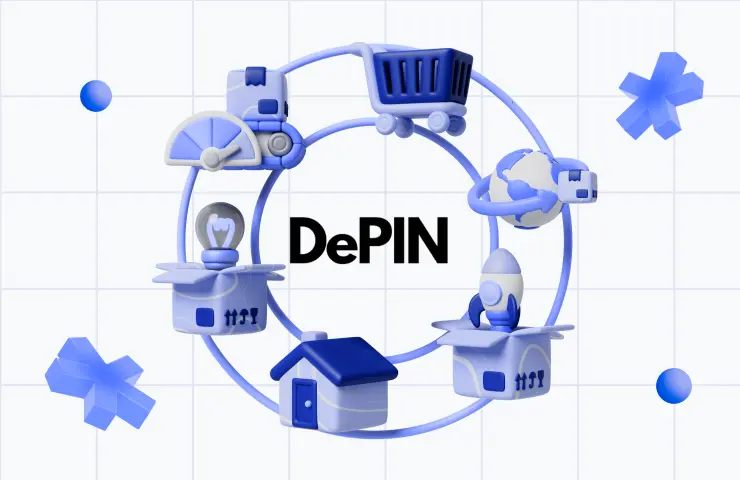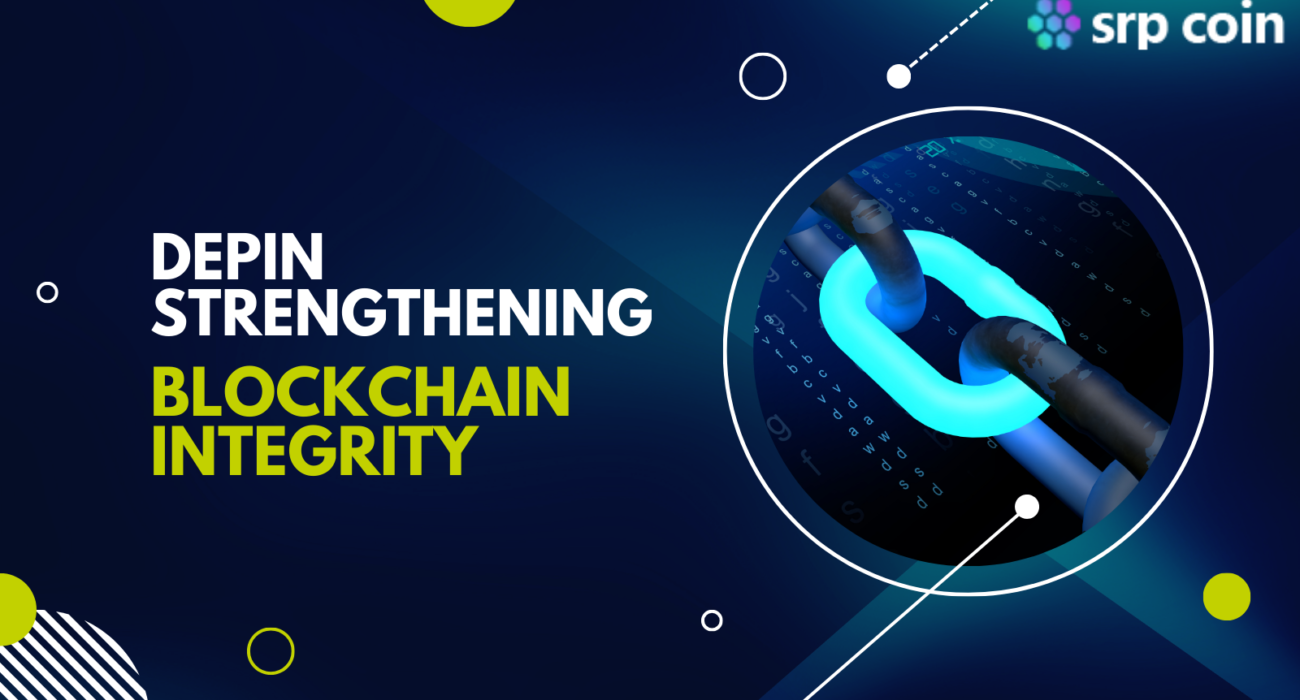Blockchain technology has transformed industries by offering secure, transparent, and decentralized systems. However, as blockchain adoption grows, the need to maintain its integrity becomes crucial. A relatively new concept, DePIN (Decentralized Physical Infrastructure Networks), is emerging as a powerful solution to help fortify blockchain networks and protect their integrity. In this blog, we will explore how DePIN Networks are strengthening blockchain integrity, the importance of decentralization, and the future impact of this groundbreaking innovation.
What is Blockchain Integrity?
Before exploring how DePIN enhances blockchain integrity, it’s important to understand what blockchain integrity entails. Essentially, blockchain integrity refers to the overall security, accuracy, and reliability of data stored within a blockchain. This means that once information is recorded on the blockchain, it remains secure, tamper-proof, and consistent across the entire network.
Blockchain achieves data integrity through decentralization and cryptography. Once a block of data is added, it becomes immutable—no one can alter or delete it without impacting the entire chain. This immutability is critical for sectors like finance, healthcare, and supply chains, where data accuracy and security are paramount. However, as blockchain systems scale and grow more complex, maintaining their integrity becomes more challenging. DePIN Networks strengthening blockchain integrity by introducing an extra layer of decentralization and security, ensuring the network remains protected and trustworthy.
Understanding DePIN Networks
DePIN (Decentralized Physical Infrastructure Networks) is an innovative framework that connects physical devices and infrastructure to a decentralized network. Unlike traditional centralized systems, where infrastructure is owned and controlled by a single entity, DePIN networks distribute the infrastructure across multiple independent nodes. This ensures that no single party has control over the entire system, making it more secure and resilient.
DePIN networks are particularly relevant to blockchain because they provide a decentralized physical layer that complements the decentralized digital layer of the blockchain. The physical infrastructure of DePIN includes servers, storage devices, and network routers that are spread across different locations and owned by various independent operators. These decentralized elements form a robust backbone for blockchain applications, ensuring that the network remains secure and tamper-resistant.
How DePIN Enhances Blockchain Integrity
The most significant benefit of DePIN networks is how they enhance blockchain integrity. By decentralizing the physical infrastructure that supports blockchain networks, DePIN reduces the risk of single points of failure and centralized attacks. Here’s a closer look at how DePIN contributes to strengthening blockchain integrity:
Improved Security
One of the primary challenges faced by blockchain networks is the potential for hacking or malicious attacks. In centralized systems, attackers can target a single point to compromise the entire network. DePIN networks distribute the physical infrastructure across multiple independent operators, making it much harder for attackers to disrupt the system. This enhanced security ensures that DePIN Networks strengthen blockchain integrity by safeguarding the physical components that underpin the blockchain.
Resilience Against Downtime
Traditional centralized networks are vulnerable to outages or failures if a single part of the infrastructure goes down. In contrast, DePIN networks offer increased resilience because the infrastructure is spread across multiple nodes. Even if one or several nodes experience issues, the network continues to function smoothly, ensuring that blockchain data remains accessible and secure. This decentralized nature of DePIN plays a crucial role in keeping the blockchain network reliable and tamper-proof.
Decentralized Governance
Decentralization is at the heart of both blockchain and DePIN. The governance of DePIN networks is distributed among the network’s participants, rather than being controlled by a central authority. This decentralized governance model ensures that no single entity can manipulate or control the infrastructure, further strengthening blockchain integrity. By distributing the decision-making process, DePIN networks help maintain the transparency and trust that are essential for blockchain networks.
Consistency Across the Blockchain
For blockchain systems to function correctly, all nodes must agree on the state of the blockchain. DePIN networks ensure that the physical infrastructure supporting the blockchain is consistent, which helps maintain the integrity of the data. By distributing the physical resources across a decentralized network, DePIN ensures that all nodes have equal access to the same data, preventing inconsistencies or data corruption.
Unlock the future of secure blockchain with SRP Token, powered by DePIN Networks strengthening blockchain integrity. Invest in SRP Token today to be part of a decentralized, tamper-proof, and secure digital future!
Decentralization: The Core of Integrity
At the heart of blockchain technology is decentralization. A decentralized system distributes control and authority across multiple participants, reducing the risk of manipulation or fraud. Blockchain networks rely on decentralized consensus mechanisms to verify and record transactions, ensuring that no single entity can control the entire system.
Similarly, DePIN networks take decentralization to the next level by decentralizing not only the digital layer but also the physical infrastructure. This combination of decentralized digital and physical layers ensures that blockchain networks remain secure, transparent, and resilient. By doing so, DePIN Networks strengthen blockchain integrity by removing any single point of control or failure, making the entire system more robust.
In essence, the core idea behind both blockchain and DePIN is to distribute power and trust across a network of independent operators. This decentralized approach is crucial for maintaining the integrity of blockchain systems, particularly as they scale and become more complex.
Real-World Examples of DePIN Networks in Blockchain
DePIN networks are still relatively new, but they are already making waves in the blockchain industry. Several projects and platforms are integrating DePIN networks to bolster their infrastructure and enhance the integrity of their blockchain systems. Here are a few examples of how DePIN is being applied:
- Helium Network
Helium is a decentralized wireless network that uses blockchain technology to create a global peer-to-peer network for IoT devices. By leveraging DePIN, Helium strengthens its network’s infrastructure, allowing IoT devices to communicate securely and reliably across a decentralized system. This ensures data integrity and security across the network, demonstrating how DePIN Networks strengthen blockchain integrity in practical applications. - Filecoin
Filecoin is a decentralized storage network that uses blockchain to store data securely. It leverages DePIN to decentralize the physical infrastructure, spreading storage across multiple independent nodes. This distributed approach ensures that data is stored securely and remains accessible even if some nodes fail, further enhancing the integrity of the blockchain system. - PlanetWatch
PlanetWatch is a decentralized air quality monitoring network that collects and stores environmental data on the blockchain. By utilizing DePIN to decentralize its physical sensors and storage devices, PlanetWatch ensures that the data collected remains tamper-proof and reliable. This is another example of how DePIN Networks strengthen blockchain integrity in real-world use cases.
Challenges and Future Prospects
While DePIN networks offer many benefits, they also face challenges. One of the most significant hurdles is scalability. As blockchain networks grow, the infrastructure supporting them must also scale to meet increasing demand. Ensuring that DePIN networks can expand without compromising security or performance is a challenge that developers are actively working to address.
Another challenge is adoption. For DePIN networks to realize their full potential, widespread adoption across industries is necessary. As more businesses and developers recognize the importance of decentralized physical infrastructure, DePIN networks will likely become more mainstream.
Looking ahead, the future of DePIN networks is bright. As blockchain technology continues to evolve, the need for secure and reliable physical infrastructure will only grow. DePIN Networks strengthening blockchain integrity will become a critical component of the blockchain ecosystem, ensuring that decentralized systems remain secure, transparent, and tamper-resistant.
Conclusion
In conclusion, DePIN Networks strengthen blockchain integrity by decentralizing the physical infrastructure that supports blockchain systems. By improving security, resilience, and consistency, DePIN ensures that blockchain networks remain tamper-proof and reliable. The decentralized governance model of DePIN networks aligns perfectly with the core principles of blockchain, further reinforcing the integrity of the entire system.
As blockchain technology continues to expand into new industries and applications, the importance of secure, decentralized infrastructure will only increase. DePIN networks offer a scalable and resilient solution that strengthens blockchain networks and ensures their long-term success.
The future of blockchain is decentralized, and DePIN is a key part of that future. By integrating DePIN networks into the blockchain ecosystem, we can ensure that decentralized systems remain secure, transparent, and capable of withstanding the challenges of tomorrow.

 China
China Russia
Russia India
India









